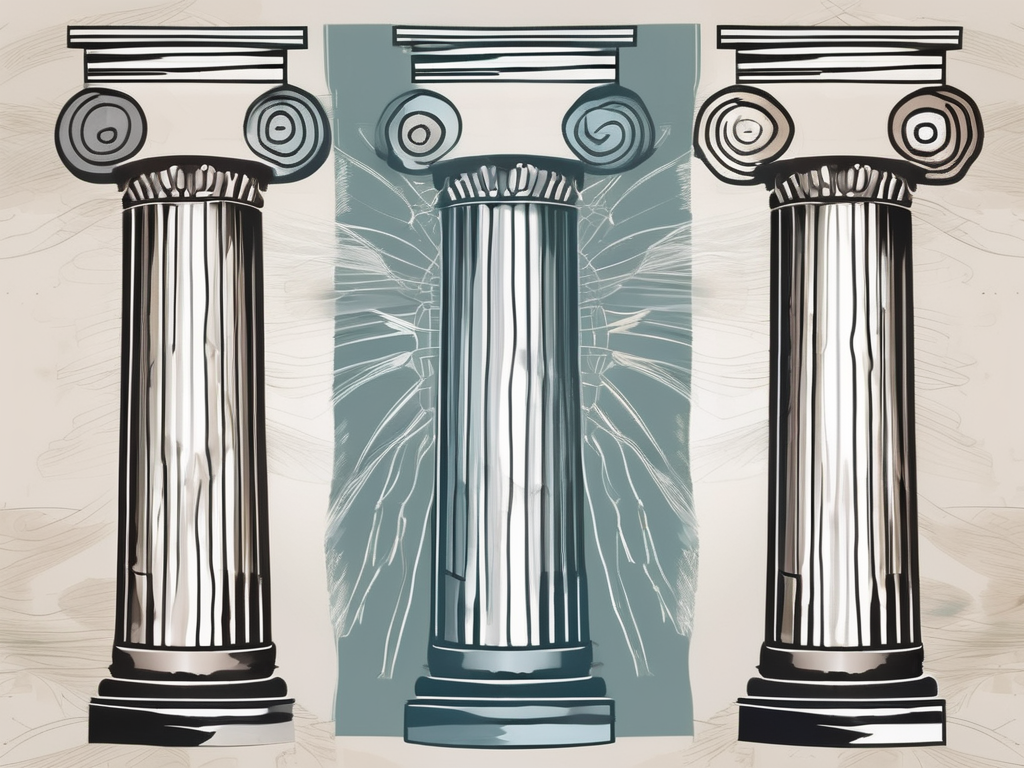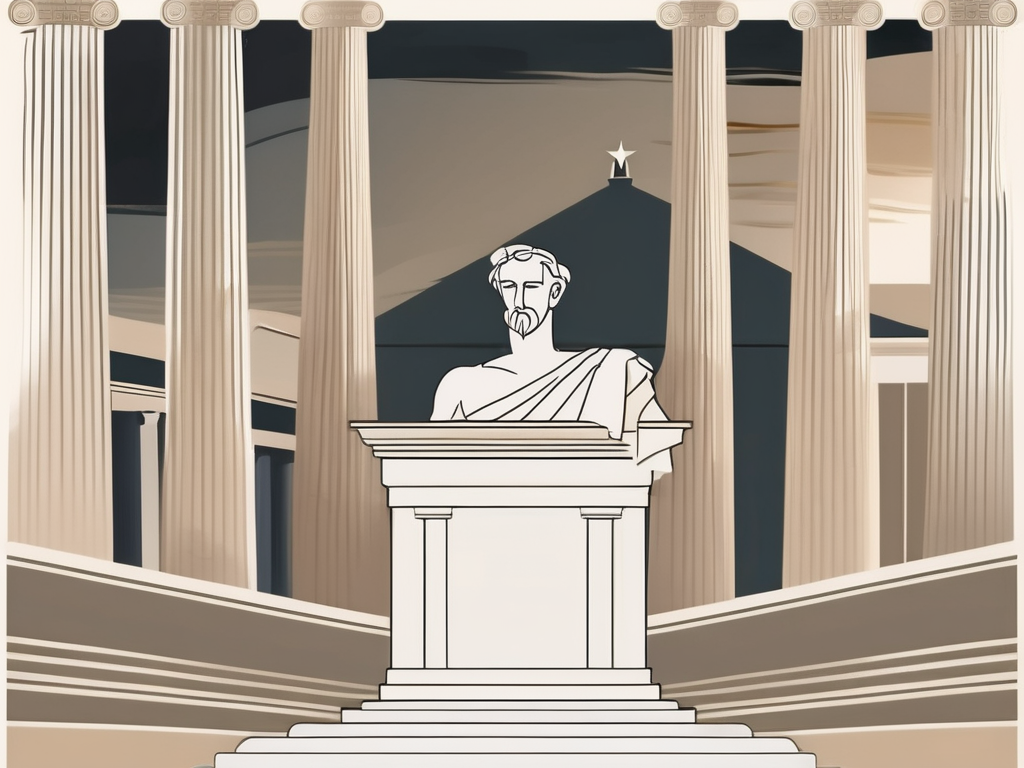Hypatia, the influential Greek philosopher, is considered one of the most remarkable thinkers of the ancient world. Her contributions to philosophy, mathematics, and astronomy have had a lasting impact on Western thought. Born in Alexandria, Egypt, Hypatia’s intellectual journey would take her on a path of knowledge, challenge, and ultimately, tragedy.
Early Life and Education of Hypatia
Hypatia, a renowned philosopher and mathematician, was born into an esteemed family of scholars in Alexandria in the year 370 AD. Her father, Theon of Alexandria, was not only a respected mathematician and philosopher himself, but also a devoted father who played a significant role in shaping her education. From a young age, Hypatia showed great eagerness for learning, absorbing knowledge from her father and other influential intellectuals of the time.
But Hypatia’s birth into a family of intellectuals was not just a matter of chance. It undoubtedly had a profound impact on her upbringing. Growing up in an environment where ideas and intellectual pursuits were highly valued, she was encouraged to embrace her curiosity and passion for knowledge. Her family’s support and guidance laid the foundation for her future success.
Birth and Family Background
Delving deeper into Hypatia’s family background, we find a rich tapestry of intellectualism and scholarly pursuits. Her father, Theon of Alexandria, was not only a mathematician and philosopher, but also a renowned teacher. He was known for his dedication to education and his unwavering commitment to the pursuit of knowledge. It is no wonder that Hypatia inherited her father’s thirst for learning.
But it wasn’t just her father who influenced her. Hypatia’s mother, whose name unfortunately remains lost to history, also played a significant role in her upbringing. As a woman of her time, she defied societal expectations and supported her daughter’s education wholeheartedly. Together, her parents created an environment that nurtured Hypatia’s intellectual growth and encouraged her to explore the world of ideas.
Hypatia’s Academic Journey
Hypatia’s academic journey began with her father’s guidance. Under his tutelage, she developed a deep understanding of mathematics, philosophy, and various other disciplines. Theon, recognizing his daughter’s exceptional intellect, spared no effort in providing her with the best education possible.
As she grew older, Hypatia’s reputation for intellectual prowess and eloquence spread throughout Alexandria like wildfire. Students from far and wide flocked to her, eager to learn from this brilliant young woman who had already achieved so much. Her lectures and discussions became a hub of intellectual activity, attracting scholars and thinkers from all walks of life.
But Hypatia was not content with simply accepting traditional teachings. She questioned established theories and proposed her own ideas, challenging the status quo and pushing the boundaries of knowledge. Her intellectual curiosity and unconventional approach to learning would later become hallmarks of her philosophical contributions.
Furthermore, Hypatia’s impact extended beyond the walls of her lecture halls. She actively engaged with the community, organizing public lectures and debates to promote intellectual discourse. Her commitment to sharing knowledge and fostering critical thinking made her a beloved figure in Alexandria, admired not only for her brilliance but also for her generosity of spirit.
In conclusion, Hypatia’s early life and education were marked by a supportive family, a thirst for knowledge, and a determination to challenge conventional wisdom. These formative years laid the groundwork for her future achievements and cemented her place as one of history’s most influential intellectuals.
Hypatia’s Contributions to Philosophy
Hypatia’s philosophical beliefs and teachings were based on Neoplatonic principles, an ancient school of thought that blended elements of Platonism, Aristotelianism, and other philosophical traditions. Neoplatonism emphasized the pursuit of knowledge as a means to transcend the material world and attain a higher spiritual understanding.
Her Philosophical Beliefs and Teachings
Hypatia’s philosophical beliefs centered around the notion that the ultimate goal of human existence was to align one’s soul with the divine. She taught that through contemplation, self-reflection, and the pursuit of wisdom, individuals could attain enlightenment and achieve a deeper connection with the universe.
Delving deeper into her teachings, Hypatia emphasized the importance of self-awareness and introspection. She believed that by understanding oneself, individuals could better understand their place in the grand scheme of things. Through this understanding, one could then strive to live a life in harmony with the natural order of the universe.
Furthermore, Hypatia’s teachings went beyond the theoretical realm and had practical applications in everyday life. She encouraged her students and followers to apply philosophical principles to their daily experiences, seeking wisdom not only in scholarly pursuits but also in their interactions with others and their engagement with the world around them.
Her teachings resonated with many of her students and followers, who were inspired by her profound insights and ability to bridge the gap between abstract philosophy and practical applications in everyday life. As a result, Hypatia’s philosophy gained significant influence and helped shape the intellectual landscape of her time.
Impact on Neoplatonism
As one of the foremost Neoplatonic philosophers of her time, Hypatia’s ideas contributed to the development and refinement of this philosophical tradition. Her innovative interpretations of Neoplatonic concepts and her ability to synthesize various philosophical ideas allowed her to offer unique insights into the nature of reality, the human condition, and the relationship between the material and the divine.
Moreover, Hypatia’s impact on Neoplatonism extended beyond her teachings and writings. Through her interactions with other philosophers and intellectuals, she fostered a culture of intellectual exchange and collaboration, helping to shape Neoplatonic thought for generations to come. Her influence can be seen in the works of her contemporaries and successors, who built upon her ideas and further expanded the Neoplatonic tradition.
Additionally, Hypatia’s role as a prominent female philosopher in a male-dominated society was groundbreaking. Her presence and contributions challenged societal norms and paved the way for future generations of women to pursue intellectual pursuits and make their mark in the world of philosophy.
In conclusion, Hypatia’s contributions to philosophy were multifaceted and far-reaching. Her philosophical beliefs and teachings not only provided individuals with a framework for spiritual growth and self-realization but also influenced the development of Neoplatonism as a philosophical tradition. Through her intellectual exchanges and collaborations, she helped shape the intellectual landscape of her time and left a lasting legacy for future generations of philosophers to build upon.
Hypatia’s Role in Mathematics and Astronomy
While Hypatia is primarily known for her contributions to philosophy, her brilliance extended to the fields of mathematics and astronomy as well. She excelled in these disciplines, making significant discoveries and advancements.
Notable Mathematical Theories
Hypatia’s mathematical theories were groundbreaking and ahead of her time. She developed new methods for solving complex mathematical problems, particularly in the field of algebra. Her work on conic sections, in particular, was highly regarded and laid the groundwork for future developments in geometry.
Furthermore, Hypatia’s mathematical prowess was not limited to theory alone. She also excelled in practical applications, using mathematics to solve real-world problems and develop innovative techniques for engineering and design.
Astronomical Discoveries and Theories
In the field of astronomy, Hypatia made significant contributions to the understanding of celestial objects and their movements. Her observations and calculations refined existing astronomical models, shedding light on the intricacies of the cosmos.
Hypatia’s work in astronomy expanded our knowledge of celestial bodies, including the planets and the moon. She meticulously documented her observations and developed theories about the nature of the universe, challenging prevailing beliefs and stimulating further exploration in the field.
Hypatia as a Woman in Ancient Greek Society
Living in a society where women were often excluded from intellectual pursuits, Hypatia faced numerous challenges throughout her career. However, her determination and exceptional abilities allowed her to overcome societal obstacles and make a profound impact on the intellectual landscape of ancient Greece.
Challenges and Triumphs
As a woman in a male-dominated field, Hypatia faced skepticism and discrimination. Despite these challenges, she persevered, employing her unmatched intellect and formidable debating skills to assert her rightful place in philosophical discourse. Her eloquence and logical reasoning not only earned her respect among her peers but also attracted a loyal following of students and admirers.
Hypatia’s notable triumphs in a society that often dismissed women’s intellectual capabilities paved the way for future generations of female philosophers and scholars, encouraging them to pursue their passions and break free from societal constraints.
Influence on Women’s Intellectual Participation
Hypatia’s influence extended beyond her own achievements. Her mere presence in the intellectual sphere challenged prevailing societal norms and inspired other women to pursue intellectual pursuits. By breaking barriers and thriving in a male-dominated field, she became a symbol of empowerment and a catalyst for change.
Hypatia’s legacy as an influential female philosopher continues to inspire and encourage women to defy gender-based limitations and embrace their intellectual potential.
The Tragic End of Hypatia
Hypatia’s life came to an untimely and tragic end, highlighting the dark side of the political turmoil that plagued Alexandria during her time.
Political Turmoil and Conflict
Around the year 415 AD, tensions between different religious and political factions in Alexandria escalated. Hypatia, being a prominent figure in the intellectual community, inadvertently became embroiled in these conflicts. Her association with prominent pagans and her refusal to align herself with any particular faction made her a target for those seeking to gain power and influence.
In a horrific act of violence, a mob of religious zealots attacked Hypatia, accusing her of promoting ideas and beliefs that contradicted their own. Her brutal murder, in 415 AD, marked the end of a remarkable life and a significant loss for philosophy, mathematics, and astronomy.
Legacy and Posthumous Recognition
Although Hypatia’s life was tragically cut short, her influence and legacy endure. Her contributions, both in terms of ideas and her exemplary life, continue to inspire scholars, philosophers, and scientists to this day.
Hypatia’s dedication to knowledge, her fearless pursuit of truth, and her unwavering commitment to intellectual freedom serve as reminders of the transformative power of intellectual inquiry. Her life stands as a testament to the profound impact one individual can have on the world, even in the face of adversity.
Today, Hypatia is celebrated as an icon of intellectual brilliance, courage, and resilience. Her name resonates through the corridors of history, reminding us of the boundless potential of the human mind and the enduring power of ideas.












